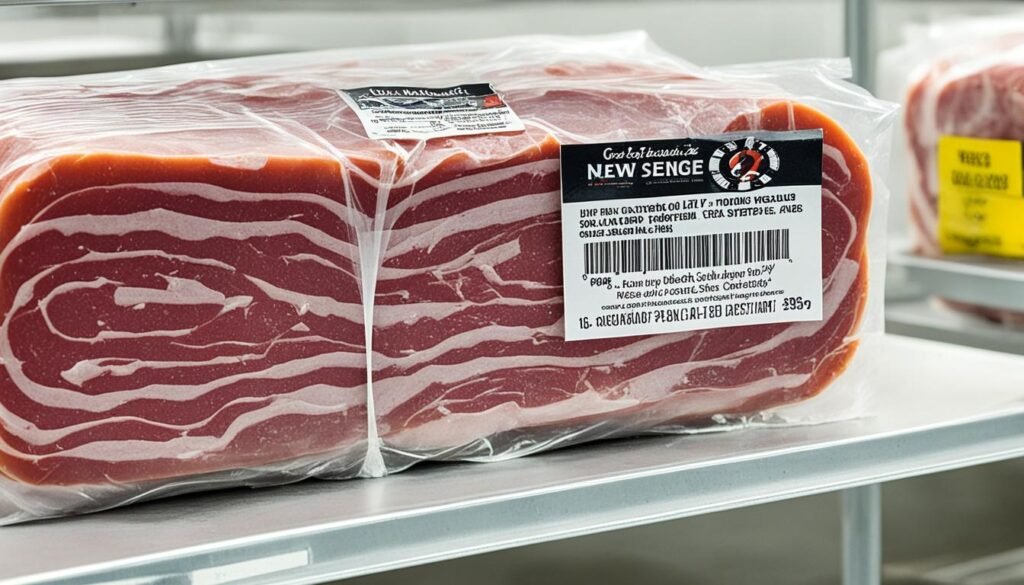Standing in front of my refrigerator one afternoon, I noticed the half-eaten package of deli meat from last week’s grocery trip. It struck me how quickly it had lost its freshness. I wondered if there was a better way to preserve it. That’s when I discovered vacuum sealing deli meats—a method that keeps my fridge organized and extends the freshness and flavor of my favorite meats. It allows me to buy in bulk and save money while keeping my deli meats delightful. The more I researched, the clearer it became that sealing deli meats would transform my meal prep game. Curious if you can vacuum seal deli meat, too? Let’s explore this effective technique and learn how it can work for us.
Vacuum sealing prevents spoilage and allows me to enjoy deli meats without the unpleasant surprises of traditional storage methods. In my journey to master this technique, I learned the importance of understanding how vacuum sealing works. It’s not just a fad; it’s a practical approach to enhancing food longevity. Ready to dive deeper into the benefits and methods of vacuum sealing? Let’s go!
If you’re eager for tips on whether hot or cold foods need to be vacuum sealed, check out this resource for more information: hot or cold foods for vacuum.
Understanding Vacuum Sealing
Vacuum sealing has revolutionized how I manage my food storage. This method removes air from packaging, significantly slowing down spoilage and extending the life of various food items. It’s especially beneficial for meats, which can deteriorate quickly if not stored correctly.
What is Vacuum Food Packaging?
Vacuum food packaging involves sealing food in airtight bags or containers after the air is removed. A vacuum food sealer ensures the food is sealed tightly, preventing oxygen exposure. This absence of air hinders bacteria and mold growth, keeping food safe for a longer period. For those preserving sliced meats or other fresh items, this method is invaluable. It ensures foods remain fresh and flavorful, reducing waste from spoilage.
Benefits of Vacuum Sealing for Food Storage
Vacuum sealing offers numerous advantages beyond just freshness. Key benefits include:
- Extended Shelf Life: Meats sealed in this way can last up to 2-3 years in the freezer, compared to a few months with traditional storage. This extended shelf life facilitates more flexible meal planning.
- Less Waste: Vacuum sealing has significantly reduced food waste for me. Foods stay edible longer, allowing me to enjoy them at my convenience.
- Improved Flavor Retention: The airtight seal not only preserves freshness but also enhances flavors, making food taste more robust when cooked or served later.
Discovering the benefits of vacuum food packaging has changed my approach to food storage. It saves me time and money in the kitchen.
Can You Vacuum Seal Deli Meat?
Absolutely, I can vacuum seal deli meat. This method is a game changer, significantly enhancing deli meat longevity. By vacuum packing cold cuts, I can keep them fresh for much longer, allowing me to enjoy my favorite meats without constant worry about spoilage.
How Vacuum Sealing Extends Deli Meat Freshness
When I vacuum seal deli meat, the absence of air prevents oxidation and microbial growth, effectively extending meat freshness. Research indicates that vacuum-sealed deli meats can last up to six months when stored properly, compared to only two weeks for those that are not sealed. This practice not only reduces food waste but also helps in maintaining the flavor and texture of the meats.
Comparison of Vacuum Sealed vs. Non-Vacuum Sealed Deli Meat
To illustrate the benefits of vacuum sealing, I find it helpful to compare the two storage methods. The table below summarizes the differences between vacuum-sealed and non-vacuum-sealed deli meat:
| Storage Method | Shelf Life | Flavor Preservation | Texture Retention |
|---|---|---|---|
| Vacuum Sealed | Up to 6 months | Excellent | Maintained |
| Non-Vacuum Sealed | 1-2 weeks | Variable | Often diminished |
In light of these findings, vacuum packing cold cuts emerges as an effective strategy for extending the freshness of my deli meats. If you’re interested in learning more about this practice, you can check out additional resources on vacuum sealing methods.

Choosing the Right Vacuum Sealer
Selecting the right vacuum sealer is crucial for effective food storage, especially when buying deli meat frequently. With numerous models available, understanding the options can make the process simpler. There are two primary types: external vacuum sealers and chamber sealers. Each type caters to different needs, making it essential to know their differences for an informed choice.
Types of Vacuum Sealers for Home Use
External vacuum sealers are the top choice for home use due to their affordability and ease of use. They are perfect for sealing deli meats and other perishables. On the other hand, chamber sealers are pricier but excel in handling large quantities and moist foods. Your preference should depend on your budget and how often you use the sealer.
Best Practices for Choosing Vacuum Packaging Bags
When picking vacuum sealing bags, the quality is as crucial as the sealer. Opt for BPA-free, high-quality bags for safer food storage. It’s wise to buy bags from the same brand as your vacuum sealer for compatibility. Adhering to these best practices for vacuum packaging ensures your deli meat stays fresh and flavorful.
| Vacuum Sealer Type | Pros | Cons |
|---|---|---|
| External Vacuum Sealer |
|
|
| Chamber Vacuum Sealer |
|
|
Using the right equipment ensures your deli meats remain fresh for a longer time, offering peace of mind. For more information on vacuum sealers, explore various models and their features that fit your food storage needs.
Steps to Properly Vacuum Seal Deli Meat
Proper preparation is crucial when vacuum packaging meats. Ensure the deli meat is as fresh as possible, ideally purchased the same day. Remove any excess moisture to prevent issues with the sealing process. Cutting the meat into manageable portions prevents waste and makes future use easier.
Preparing Deli Meat for Vacuum Sealing
With the deli meat prepared, I select my vacuum sealer and bags. It’s essential to use bags designed for vacuum sealing to ensure a high-quality seal. I lay the meat flat in the bag, ensuring a snug fit for optimal sealing. This step helps prevent spoilage and ensures the meat stays fresh.
Sealing Techniques for Optimal Freshness
Sealing techniques are crucial for maintaining freshness. After placing the meat in the bag, I remove all air and check for any pockets. A tight seal is vital to protect the meat from oxidation and freezer burn. Storing the bags flat in the refrigerator or freezer helps maintain freshness. These steps are key to keeping deli meat fresh for a longer period.
FAQ
Can I vacuum seal deli meat that I’ve bought pre-packaged?
Indeed, you can vacuum seal pre-packaged deli meat. Ensure the expiration date is current and the packaging is undamaged before sealing.
How long can vacuum-sealed deli meat last in the fridge?
Vacuum-sealed deli meat can extend its shelf life to six months in the fridge. This is significantly longer than the couple of weeks for non-vacuum-sealed varieties.
Can I use regular plastic bags instead of vacuum-sealing bags?
Regular plastic bags are not suitable for vacuum sealing. They do not offer the same airtight protection as vacuum sealing bags, potentially leading to spoilage. It’s advisable to use high-quality, BPA-free vacuum sealing bags.
What are the best practices for storing vacuum-sealed deli meats?
For optimal storage, place vacuum-sealed deli meats flat in the refrigerator or freezer. This maximizes space and ensures even freezing. Always keep the seal airtight and free from pockets to maintain freshness.
Is it safe to vacuum seal cooked deli meats?
Vacuum sealing cooked deli meats is safe and extends their freshness. However, ensure they are cooled down before sealing to prevent condensation inside the package.
Can I vacuum seal other types of meats besides deli meats?
Absolutely! Vacuum sealing is effective for various meats, including raw and cooked types like chicken, beef, and pork. It enhances preservation and extends shelf life.
How do I know if my vacuum sealer is working properly?
Verify that the vacuum sealer creates a tight seal without air pockets. If air re-enters the bag, the seal may require adjustment.
